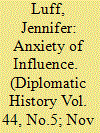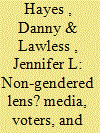| Srl | Item |
| 1 |
ID:
174946


|
|
|
|
|
| Summary/Abstract |
In June 1919, a leaked communiqué printed in New York exposed the “all-pervading system of British intrigue” in the United States during the Great War. The anonymous pamphlet, titled The Re-Conquest of America, reproduced a diplomatic cable that summarized Britain’s covert activities. British intelligence agent William Wiseman and his colleagues had sought to drive Americans into an “Anglo-American alliance” by triggering “anxiety concerning the staunchness of the structure of the nation.” They had begun by “impugning the loyalty to the United States of the Irish, German, and other riff-raff here.” Wiseman’s team had produced a “persecutory mania” by publicizing “German-American and Irish-American plots—discovered and disclosed by our American Secret Service and Military Intelligence Department with carefully calculated timeliness.” Wiseman boasted that “we encouraged the common people to spy upon and to denounce their neighbours; and an orgy of persecution followed.”
|
|
|
|
|
|
|
|
|
|
|
|
|
|
|
|
| 2 |
ID:
140189


|
|
|
|
|
| Summary/Abstract |
Much research in the study of U.S. politics has argued that female candidates for elected office are treated differently—and often worse—than male candidates in the press and by the public. Although these patterns do not doom women to electoral failure, they raise a formidable series of obstacles that often complicate women’s path to elective office, slowing the move toward gender parity in representation. Broad changes to the American political landscape, as well as methodological limitations of previous work, however, suggest the need for an updated assessment. We rely on a detailed content analysis of local newspaper coverage from nearly 350 U.S. House districts and nationally representative survey data from the 2010 midterms to provide a comprehensive evaluation of whether women experience a more hostile campaign environment than do men. We find that candidate sex does not affect journalists’ coverage of, or voters’ attitudes toward, the women and men running for office in their districts. Rather, reporters’ portrayals and citizens’ assessments of candidates stem primarily from partisanship, ideology, and incumbency, not the sex of the candidate. Although our results differ from much of the existing literature, we regard them as a valuable point of departure for answering pressing questions about gender and representation in contemporary politics, both in an American and comparative context.
|
|
|
|
|
|
|
|
|
|
|
|
|
|
|
|